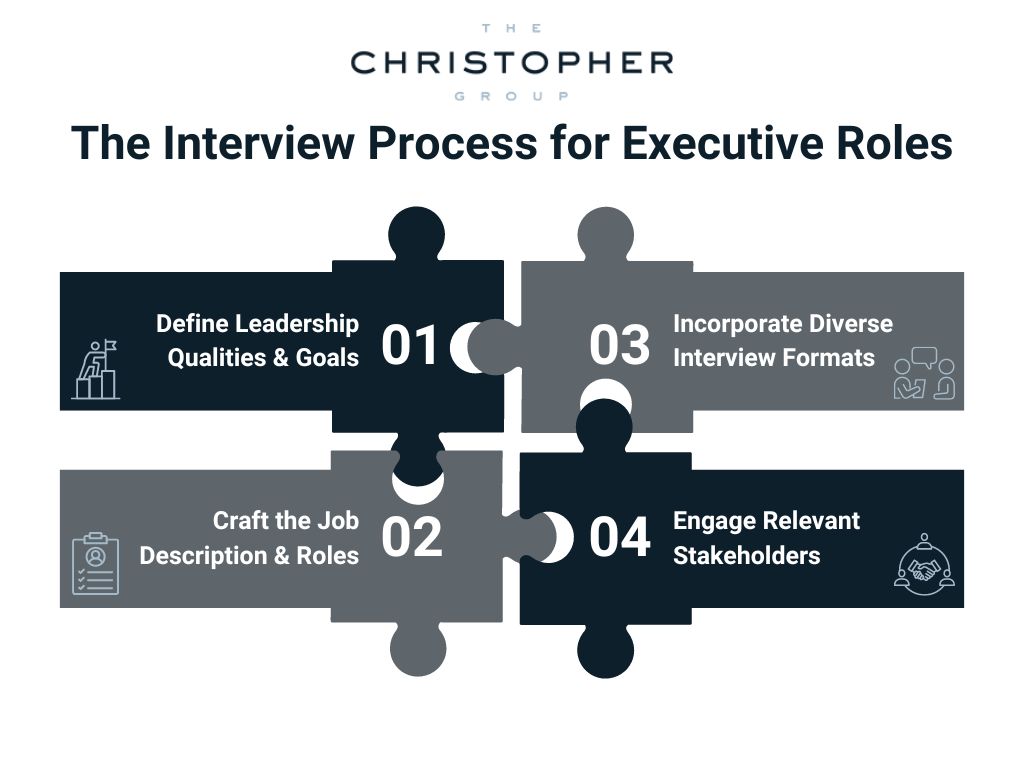Identifying top executives requires a strategic approach that goes beyond traditional interviewing methods. Asking the right questions can uncover valuable insights into a candidate’s leadership style, problem-solving skills, and cultural fit. Two critical questions to consider are, “How would you handle a team member’s underperformance?” and “Tell me about a time when you had to make a difficult decision.” These executive interview questions are pivotal in recruiting, as they help reveal a candidate’s suitability for high-level roles.
Defining Executive Success in Your Organization
Understanding what success looks like for executives in your organization is essential. Executive roles must align with the company’s goals, culture, and core values. Strategic questioning during the hiring process ensures that the selected executive not only meets but exceeds these expectations. Crafting a job description that accurately reflects the position’s expectations and responsibilities is the first step in this process.
Defining success starts with a clear vision of the company’s strategic goals. It’s essential to align executive roles with these goals to drive organizational success. For instance, if your company prioritizes innovation, you’ll want leaders who demonstrate strong critical thinking and problem-solving skills. If maintaining a robust company culture is vital, seek leaders with effective communication and team-building abilities. This alignment ensures that executives not only fit the role but also drive the company towards its long-term objectives.

Outlining the Interview Process for Executive Roles
Developing an interview process for executive roles involves several key steps:
- Define Key Leadership Qualities and Goals: Determine the leadership qualities and company goals that are crucial for the executive role.
- Craft the Job Description: Ensure that the job description accurately reflects the responsibilities, expectations, and required skills for the position.
- Incorporate Diverse Interview Formats: Use panel interviews, situational assessments, and other formats to effectively gauge leadership abilities and problem-solving skills.
- Engage Relevant Stakeholders: Involve management and other stakeholders in the interview process to ensure a comprehensive evaluation.
Incorporating different job interview formats can provide a well-rounded view of the candidate’s abilities.
- Panel interviews allow various stakeholders to evaluate the candidate from multiple perspectives, ensuring alignment with company culture and goals.
- Situational assessments, on the other hand, test how candidates handle real-life scenarios, providing insights into their critical thinking and decision-making processes.
Additionally, involving relevant management and stakeholders in the interview process ensures that the candidate is evaluated comprehensively. These individuals can offer valuable insights into the candidate’s potential fit within the team and the organization as a whole.
Essential Interview Questions for Executive Candidates
To identify the best executive talent, focus on these areas and sample questions:
Leadership and Vision
- Question: “How would you handle a team member’s underperformance?”
- Insight: Reveals leadership and performance management style.
- Question: “Tell me about a time when you had to make a difficult decision.”
- Insight: Demonstrates decision-making process and resilience.
- Question: “What are your strengths and weaknesses?”
- Insight: Assesses self-awareness and willingness to improve.
- Question: “How do you inspire your team to achieve long-term goals?”
- Insight: Evaluates ability to motivate and lead teams effectively.
Strategic Decision-Making
- Question: “Describe a situation where you had to implement a significant change.”
- Insight: Evaluates change management skills and strategic thinking.
- Question: “How do you prioritize and manage multiple projects?”
- Insight: Assesses time management and organizational skills.
- Question: “Can you provide an example of a strategic initiative you led?”
- Insight: Demonstrates strategic planning and execution abilities.
Cultural Fit
- Question: “How do you ensure your team aligns with the company’s core values?”
- Insight: Measures alignment with company culture and values.
- Question: “Describe a time when you had to navigate a conflict within your team.”
- Insight: Assesses conflict resolution skills, drive to be a team player, and ability to maintain a positive work environment.
- Question: “What do you believe is the most important aspect of our company culture?”
- Insight: Evaluates understanding and appreciation of company values.
Crisis Management
- Question: “Can you give an example of how you managed a crisis?”
- Insight: Assesses crisis management skills and ability to remain calm under pressure.
- Question: “How do you communicate bad news to your team?”
- Insight: Evaluates verbal communication skills and approach to difficult situations.
- Question: “Describe a time when you had to make a quick decision with limited information.”
- Insight: Demonstrates ability to think on their feet and handle pressure effectively.
What to Look For in Candidate Responses
Interpreting candidate responses involves evaluating their leadership skills, communication skills, and strategic thinking. Look for specific examples and past achievements as indicators of future performance. Effective communication and clear vision are critical for executive leadership roles, so pay attention to how candidates articulate their experiences and decisions.
Leadership Style and Communication Skills
When evaluating leadership style, consider how the candidate describes their approach to leading teams and handling conflicts. A strong leader should demonstrate empathy, adaptability, and effective communication. For example, a candidate who demonstrates a detailed thought process for handling underperformance shows their ability to address issues constructively.
Strategic Thinking and Problem-Solving
Strategic thinking and problem-solving skills are crucial for executives. Look for candidates who can clearly explain their decision-making processes and provide examples of successful strategic initiatives. Their ability to analyze situations, anticipate challenges, and develop innovative solutions is a strong indicator of their capability to drive the company forward.
Specific Examples and Achievements in Previous Positions
Candidates who offer specific examples and detailed accounts of their achievements demonstrate their past experience and reliability. These examples should highlight their ability to achieve goals, manage teams, and overcome challenges. Performance in previous roles is often the best predictor of future success, so prioritize candidates who can substantiate their claims with concrete evidence.

Securing the Best Leadership Talent with an Executive Recruiting Firm
Strategic interviewing for leadership positions offers long-term benefits by ensuring the right fit for the organization. At The Christopher Group (TCG), we specialize in executive searches, focusing on identifying and placing potential leaders who can drive your organization toward success. Our commitment to diversity and inclusion in executive recruitment sets us apart.
TCG’s unique approach to executive search combines deep industry knowledge with a commitment to understanding the specific needs of your organization. We recognize that every company is different, and we tailor our search process to find candidates who not only have the necessary skills but also align with your company’s culture and values. Our expertise in executive searches and our extensive network of professionals enable us to identify and attract top talent efficiently.
Contact TCG
For organizations seeking to fill executive positions with top talent, partnering with an experienced executive recruiting firm like TCG can make a significant difference. Contact us today to learn more about our executive search services and how we can help you identify and secure the best leadership talent for your organization.

